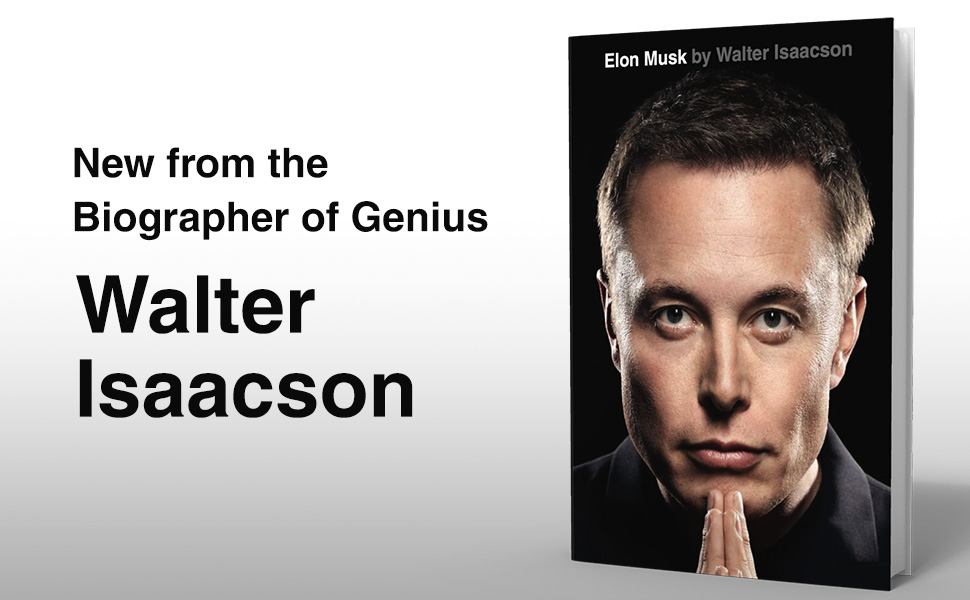Elon Musk Without Masks: A Review of Walter Isaacson’s Biography
16th Oct 2023
In September, the renowned biographer Walter Isaacson released a book titled “Elon Musk,” which delved into the life of the eccentric entrepreneur from his early years to the present day. Let’s take a look at what Isaacson has uncovered.
A Review of Walter Isaacson’s book ‘Elon Musk’
Elon Musk boasts an equal number of admirers and detractors. Some hail him as a visionary genius set to rescue our civilization, while others dismiss him as a dreamer with far-fetched ideas about Mars colonization, Hyperloop transportation, robotaxis, and subterranean city tunnels. He has stood major space industry players on their heads and revolutionized the American space sector. So, who is the real Elon Musk?
Walter Isaacson, as a renowned biographer of our era, presents his view on the man. He is a seasoned biographer, having previously penned the life stories of luminaries such as Einstein, Benjamin Franklin, Leonardo da Vinci, Jennifer Doudna, and Steve Jobs.
In his quest to unveil the authentic Musk, Isaacson spent two years gathering information. He conducted numerous interviews with Musk himself, his company’s employees, friends, and even family members, including ex-wives and his father, who had seldom interacted with the media in the past. Furthermore, Isaacson had the privilege of reviewing some of Musk’s personal emails and correspondences, and he attended various meetings with the entrepreneur.
Elon Musk and his ‘X’es
“If you aspire to conquer the world, ‘X’ is the ultimate choice for a name.”
The letter “X” has emerged as Musk’s primary symbol, employed in both his company titles and his children’s names. The journey of “X” commenced in 1999 when Musk christened his enterprise X.com, envisioning it as an all-encompassing platform for financial services. His grand plan was to transform X.com into a multifaceted entity, combining banking services with a social network. Remarkably, this ambition persists even a quarter of a century later, exemplified by his involvement with Twitter, now referred to as Х.com.
In 2000, the inaugural X.com merged with another electronic payment system, named PayPal. Musk invested considerable effort into retaining the “X” in the company name. Nevertheless, feedback from a focus group indicated that users perceived “X.com” as an uncertain website, prompting the decision to preserve the partner’s name.
In 2020, Musk welcomed his sixth child into the world, and their chosen name resembles an automatically generated password: X Æ A-12. Yet, for everyday purposes, the parents affectionately refer to him as “X.” According to the book, Musk is a father to a total of ten children, excluding his firstborn, Nevada, who tragically passed away as an infant.
Is Elon Musk a superhero or an adversary of Ukraine?
In the Elon Musk book review, he comes across as a man with a mercurial personality and ever-shifting inclinations. Walter Isaacson dubs these shifts “Musk’s modes.” His mood cycles from light to dark, from tense to jovial, from detached to intensely empathetic, occasionally delving into a state that his third wife, singer Grimes, referred to as “demonic.”
Musk’s brother, Kimball, describes him as a “drama magnet.” From a young age, under the influence of his overbearing father, Elon developed a proclivity for tumult and theatrics, both in his professional and personal life. He seems to thrive on crises and deadlines, with the tension keeping him alert and even, at times, causing physical distress. This is where he draws his energy.
Elon endured a challenging childhood. As a young boy, he found solace in superhero comics, often retreating to a quiet corner of the library as other children shunned him. He dreamt of a world-saving role.
When Russia launched an assault on Ukraine, Musk seemingly activated his “superhero mode” and rushed to aid. In the initial hours of the Russian invasion, hackers targeted a Viasat satellite, disrupting the Ukrainian armed forces’ command and control system. Two days later, the first 500 Starlink terminals arrived in Ukraine, with Musk personally overseeing their setup and deployment. However, at a certain point, Musk switched to a different mode – the crisis-hero-drama mode.
Musk got wind of the Ukrainian military’s plans to attack the Black Sea Fleet. According to Isaacson, the Russian ambassador convinced him that this could provoke a nuclear retaliation. Musk, once again, found himself in a position to save the world, but this time by abruptly shutting down Starlink service around Crimea without prior warning. The operation of the Ukrainian Armed Forces ended in failure.
The “Idiot Index”
Elon Musk is an exacting manager who has little regard for the idea of work-life balance. In his role as the CEO of six companies, he occasionally imposes a state of “panic mode” on one of them, seemingly at his discretion.
Musk is not one to readily engage in partnerships, whether on a personal or professional level. He has the capacity to inspire, unsettle, and at times, intimidate his colleagues. However, the spirit of teamwork is not a defining characteristic of his personality, and he tends to shy away from sharing power. A significant portion of Musk’s success in the industrial realm can be attributed to his unwavering attention to engineering details and his willingness to challenge established industry practices. He fervently advocates for “vertical integration,” which involves in-house creation of components rather than outsourcing. This approach has resulted in cost reductions in the production of rockets and electric vehicles. To gauge economic efficiency, Musk has introduced a unique metric.
The “Idiot Index” is a measure of the total component cost relative to the cost of the raw materials used for its production. For instance, a component with a high “Idiot Index” might cost $1,000 to manufacture while the raw material it’s composed of costs only $100. Musk humorously quips, “If the index is high, then you are an idiot.”
Elon Musk’s concern for humanity is primarily viewed in a macroeconomic context. He is willing to invest his full energy in his mission and anticipates the same level of dedication from others. Nonetheless, in his perspective, individual people are regarded as “tools for achieving this larger objective”. “But sometimes tools get worn down and he feels he can just replace that tool.” Musk believes that those who prioritize comfort and leisure in their work should seek opportunities elsewhere, a stance he demonstrated when he acquired Twitter.
Walter Isaacson’s Elon Musk book review – final words
Walter Isaacson concludes the book with a contemplation on whether Elon Musk’s accomplishments would have been feasible without his challenging behaviour. Could a more restrained Musk have achieved the same level of success as the unfiltered and unrestrained version? Is being unfiltered and uninhibited an intrinsic aspect of his character? Would it have been possible to launch rockets into orbit or facilitate the transition to electric cars without embracing all facets of his personality, both the relevant and seemingly unrelated ones? Sometimes great innovators are risk-seeking man-children who resist potty training.
At the same time, Elon Musk’s actions sometimes place people in danger, including those who work for him, those who purchase his products, and even those who oppose him. This prompts the question of whether his efforts to save humanity justify the potential risks and costs involved. This Elon Musk book review goes a long way in toward answering that whestion.






Thank you for your comment! It will be visible on the site after moderation.